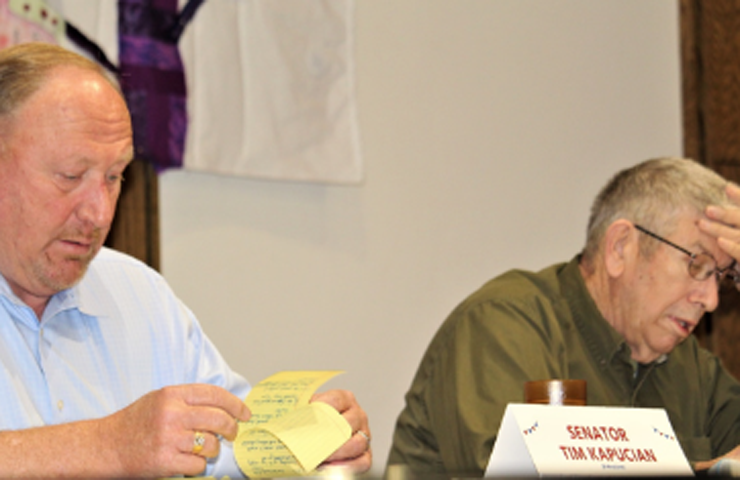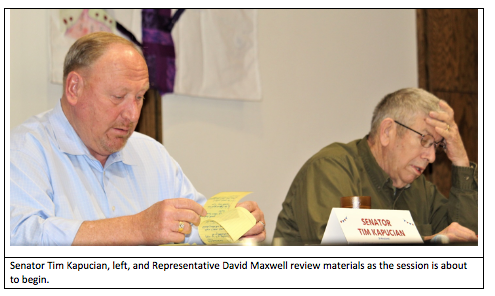
By Michael McAllister
Thanks to Grinnell’s League of Women Voters, area residents took advantage of a third opportunity to seek explanations from lawmakers at the April 6 legislative coffee at the First Presbyterian Church Saturday morning.
Approximately 55 people attended the session, which will be the last of the legislative season.
Coming at the end of the Iowa legislature’s second funnel week, the meeting gave the public the opportunity to ask district legislators specific questions about issues in progress in the statehouse.
Medicaid
The privatization of Iowa’s Medicaid program has been controversial since its inception, and recently the issue has picked up intensity with the announcement that United Healthcare, one of two for-profit corporations still administering the program, will cease operations.
The first question to Senator Kapucian and Representative Maxwell raised concerns about the treatment of rural areas and the rates currently paid to providers.
Kapucian had addressed the United Healthcare issue in his opening remarks, downplaying the impact of the company’s exit. He said United sought a “guaranteed income” and that Governor Kim Reynolds “was adamant that she was going to stick to her guns.”
A transition was already “in the works,” Kapucian asserted, with about 50% of United Healthcare” Medicaid recipients sent to navigate to Centene even if United had announced intentions to remain in Iowa.
He referenced Centene as the company that will replace United Healthcare and said of the former, “I think they’re going to be a better actor.” He asserted that the company is already operating in 31 states.
Kapucian reported progress in adjusting the rates by which long term care facilities are reimbursed for providing care to Medicaid residents. Calling such adjustments “long overdue,” he said he was happy to know that discussions between the Iowa House and Senate are in progress.
As for health care privatization in general, Kapucian declared that “complaints from the providers have gone down 80%.”
He invited questions and information about specific instances, emphasizing that most cases directed to his attention have been resolved. “It takes a little while,” he added, since privacy requirements must be observed and paperwork is involved, but specific information is necessary if specific problems are to be solved.
Water and Air Quality
The lawmakers were asked directly what they intend to do to improve Iowa’s air and water quality.
“Don’t tell me what you’ve done,” the questioner insisted, “because that obviously has not been enough.”
Representative Maxell stressed work being done by the universities of Iowa that is producing useful information.
“We’ll keep working on it,” Maxwell concluded.
Kapucian cited last year’s water quality bill and present efforts encouraged by various agencies.
Bumper strips, Kapucian noted, can be effective in reducing nutrient runoff in farming operations, but he feels federal regulations are too restrictive and limit the value that such strips might contribute to an operation’s overall revenue.
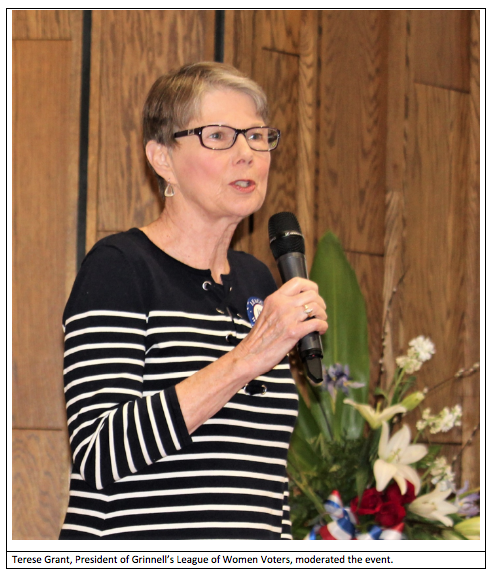
Nominating Procedures for Judges
One matter that has received extensive attention has to do with how Iowa obtains judges and justices. Critics say the proposed measure will politicize the selection process. When a questioner raised the issue to the legislators, Senator Kapucian reported that he had voted for the bill (SF 237) because he feels that the proposed changes will make the system less politicized than it already is.
Kapucian supported his claim by noting that, under the proposed system, the minority party in the Senate and the House will carry more influence.
Representative Maxwell, referring to the bill, predicted, “I don’t think it’s going to go anywhere in the House.” He doubts that the bill will come to a vote; if it should, he feels that enough definite “no” votes are on hand to defeat it.
Maxwell noted, however, that sometimes votes change when pressure is applied. He added that he had been to Governor Reynolds’ office to discuss the matter. “I don’t know if we agreed to disagree, but Iagreed to disagree,” he summarized.
Election Procedures
Asked about proposals to clarify absentee ballot requirements and to modify other election provisions, such as shortening the number of hours that polling places are open on election day, Kapucian expressed approval of measures to prevent contested races such as the one that developed in House District 55 after the 2018 election. The Republican candidate won by nine votes while 29 absentee ballots remained unopened because of disagreements over wording of the Iowa Code and barcoded postmarks.
“I don’t like seeing those types of things happen,” Kapucian said.
He did not go into details regarding other proposed changes except to note that “some of these things are also requested by county auditors,” although he did not specify what proposals might have come from that source.
Maxwell agreed that absentee ballot requirements need to be amended. (The House voted unanimously to approve HF 692, which addresses the issue.)
He referred to “quite a number” of absentee ballots that were not counted throughout the state, but in those cases the margins were not as critical as in the District 55 contest.
“We really don’t want that to ever happen again,” Maxwell concluded, “because if one person doesn’t get their vote, it’s not right.
Public Education Infrastructure Funding and Children’s Mental Health Initiatives
Both lawmakers were positive toward SAVE (Secure an Advanced Vision for Education) dollars and new legislation to set in place a program for evaluating children’s mental health.
Regarding SAVE funding, Kapucian said he was “99% sure” that legislation to continue the present program would pass.
Maxwell noted that the House overwhelmingly passed its version of the SAVE bill.
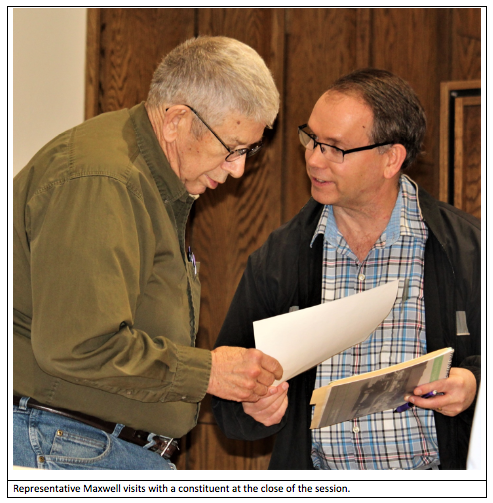
Representative Maxwell visits with Dion Schrack at the close of the session.
Poweshiek County Board of Health
One member of the Poweshiek County Board of Health raised the issue of inspecting septic systems, calling for more local control instead of regulations being set at the state level.
Representative Maxwell concurred.
Senator Kapucian provided some background to the issue. One senator, he said, found himself required to use a representative from the company that installed his system to the tune of $400 per year. Proposals to allow more flexibility are underway, Kapucian indicated.
Criminal Justice Reform
A volunteer at the Newton Correctional Facility introduced the issue of overcrowding and understaffing at Iowa sites of incarceration. “What does the legislature intend to do?”
“That’s a good question,” Representative Maxwell responded. He stated he would have to research the issue further.
Senator Kapucian reported that the Senate Judiciary Committee is “working on some reforms.” These measures could include reducing some current felonies to misdemeanors.
Senator Grassley is working on the matter at the federal level, Kapucian related, adding, “The whole system needs to be looked at.”
Kapucian then added an interesting aside as he referred to the governor’s efforts to restore voting rights to felons. Called “one of the governor’s signature priorities this year” by The Des Moines Register, a constitutional amendment to allow felons to vote following completion of their sentences was set in motion this session, passed the House almost unanimously, but died in the Senate when lawmakers said they need to clarify precisely what completing a sentence means.
Kapucian referred to “a very emotional, heartfelt personal story by Senator Miller Meeks from Ottumwa” regarding her brother and the impact that loss of voting rights had on him.
Kapucian stated that he was “looking forward to voting for restoration of felons’ voting rights” once they have served their sentences and have returned to society, and he was disappointed “a lot” to learn the night before that the bill did not come out of its Senate committee.
On the other hand, Kapucian said he knew of one senator with a family member who was a victim of crime and that he—the senator—was of a different mind.
“When you’re back home, everything’s black and white,” Kapucian commented. “But when you get into a bigger group and you hear all sides, everything becomes gray. And that’s what we deal with—gray issues—every day.”
Land Acquisition by Natural Heritage Foundation and Department of Natural Resources
A questioner asked about the legislators’ votes on a bill that would prohibit private organizations from purchasing land from a low-interest revolving fund for environmental-improvement projects.
Specifically, the bill addresses the practice of the Natural Heritage Foundation of buying ground and holding it for the Department of Natural Resources. The matter has been discussed at previous legislative coffees.
“I voted for that bill,” Senator Kapucian responded, stressing that the Natural Heritage Foundation is “a non-public entity,” meaning that the agency should not be able to access the funds in question for the purchase of land.
“We’re getting calls from farmers,” Kapucian reported, complaining of unfair competition for land purchases.
Getting outbid is a fact of life, one farmer said, and it’s one that he is willing to accept. “But when I’m bidding with my pocket and they’re bidding with my pocket through taxpayer-funded subsidies….” “That’s where the question is,” Kapucian concluded.
The senator was quick to add that the Natural Heritage Foundation “does great work.” The issue, however, remains that, to some people, the organization is permitted unfair borrowing and buying opportunities.
Kapucian noted that affected parties are communicating and that “We’re going to work together” to resolve the issue.
Maxwell concurred that cooperation is at work and that a loophole seems to exist. He voted for the bill to move out of the House Ways and Means Committee so that it could receive further debate.
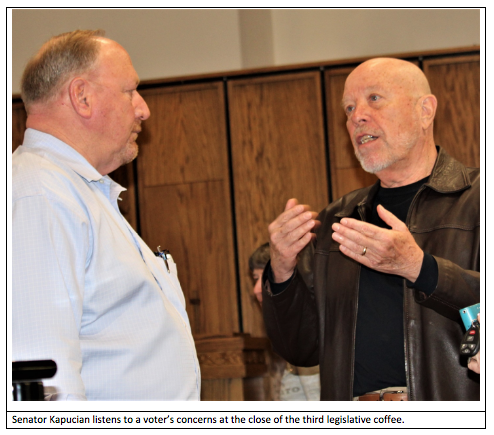
Senator Kapucian listens to Don Schilds concerns at the close of the third legislative coffee.
Hog Confinement Operations
A questioner referred to “a very sad situation” in Poweshiek County involving plans to place a hog confinement operation close to a personal residence that serves foster children. “What are we going to do about these hog confinement” operations? “We are sacrificing people’s lives,” the questioner asserted.
Representative Maxwell mentioned past efforts to change the manure management matrix but noted that such efforts have not produced results. He referred to fans and air quality control devices now in place at some facilities as steps in the right direction, but he acknowledged that only “one company is doing that.”
“I don’t like to see that go in there,” Senator Kapucian responded, referring to the specific instance mentioned by the questioner. “I think we need to do a better job,” he added.
The matrix is a problem, he noted, because attempts to revise it might include unwanted consequences.
Some people call for a moratorium on CAFOs (concentrated animal feeding operations), but Kapucian said—as he has before—that he does not agree. However, he said, “I think that the separation distances should be adjusted.”
“And just because you can doesn’t mean you should,” he commented.
“There’s a lot of good people out there that work with these hog operations, but there’s always some bad actors…in any group.”
Kapucian recommends “strong advocacy,” referring to what he called effective measures in a previous instance involving Lake Ponderosa, but the questioner discounted that example, saying that the company involved was paid off.
Solar Energy Fees
The final issue raised by a questioner had to do with solar panels and an intense campaign by an advocacy group alleging that people with solar panels pass the cost of such panels off to regular energy consumers.
“I get a bill every month that I pay…. What’s more disturbing to me [is that] dark money can come into our state, influence everybody including our lawmakers with millions of dollars in television ads, to get their bill passed.”
“I hope that’s not the future,” the questioner concluded.
The comments drew applause from the audience.
Both Maxwell and Kapucian were sympathetic to the questioner’s concerns. Kapucian had addressed the issue in his opening remarks. He lamented the amount of money spent to advocate positions and to support candidates, stressing that so much money could be directed to better purposes.
In his opening remarks, Kapucian referred to the issue, echoing his previous position that people connected to the energy grid should have to pay something but that energy companies such as Mid America and Alliant ought not be given “carte blanche” to determine charges.
He mentioned a prior experience with Alliant Energy in which he did not feel that the energy company had been honest with him, and he declared, “You can thank Alliant for my “no” vote.”
As the session ended, Terese Grant reminded people that legislators welcome questions and comments.

